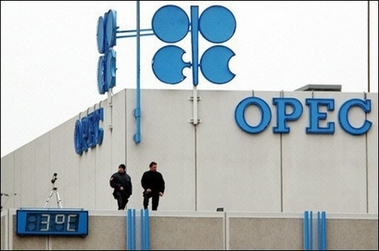VIENNA - OPEC ministers headed into their meeting here signalling that they
would maintain the cartel's official output ceiling against the backdrop of
falling oil prices.

Security officers
overlook a street from a rooftop of the OPEC headquarters in Vienna. OPEC
ministers headed into their meeting in Vienna signalling that they would
maintain the cartel's official output ceiling against the backdrop of
falling oil prices. [AFP] |
However, they were facing calls to react to the spectre of oversupply and a
deeper decline in prices, including from within their own ranks.
The president of the Organisation of Petroleum Exporting Countries, Nigeria's
Oil Minister Edmund Daukoru, publicly said he was "very concerned" about the
situation, just two months after the price of crude peaked at 78.40 dollars a
barrel.
Crude oil prices fell to 66.25 dollars a barrel by Friday.
"The market is really well supplied. Stocks have really built up. Spare
capacity is also building up. Non-OPEC capacity is growing quite fast. It is a
time to really look at it all," he told reporters Sunday.
He also said that the geopolitical situation, one of the key reasons given by
OPEC for its high output level, has "cooled off somewhat".
Tensions over Iran's disputed nuclear programme, which have helped drive
prices higher, eased last week. And on Sunday, senior European Union and Iranian
officials meeting in Vienna underlined progress in last-ditch talks to avert UN
sanctions over Tehran's plans.
Nonetheless, other national representatives from OPEC, which provides about a
third of global oil supplies, insisted over the weekend that they wanted to
maintain the ceiling of 28.0 million barrels a day they set in June 2005.
The 10 members bound by the output ceiling produced about 500,000 barrels per
day less than the quota in July, according to figures from OPEC.
Saudi Arabian Oil Minister Ali al-Nuaimi dismissed concern about the drop in
crude prices and described it as a sign that the market was stabilising.
"The demand is very well satisfied ... The market is very comfortable and
well supplied. We are very happy with the situation," he said.
"I don't expect any change in the quota," said Shukri Ghanem, head of Libya's
National Oil Company and the country's representative at the OPEC meeting.
Falling prices represented "a correction," he told reporters.
Qatar's minister Energy Minister Abdullah bin Hamad al-Attiyah saw "no other
alternative" to the current quota "unless somebody has another proposal".
"But I don't hear it ... I don't hear any new proposal," he said.
A decision Monday to maintain the ceiling would continue a policy of keeping
the market well supplied in a bid to cool overheating prices.
Oil tripled in value from 2002 to mid-July on surging global demand as well
as fears about interruptions to production in Iran, Nigeria and Iraq.
But OPEC's bid to stifle volatility in oil markets could also be turned
around to stop prices dropping too low as those pressures ease. Attiyah
acknowledged that could be on the cards at the ministers' next meeting in
December in Nigeria.
"If we feel the market needs to cut to stabilise, we will do (so). So when we
come to our next meeting we will have an open agenda. All the scenarios will be
discussed," he said.
Analysts also highlighted the growing prospect that a seasonal decline in
demand following peak consumption during winter in industrialised countries
could be amplified by the forecast slowdown in the world economy next year.
Carl Calabro of the US consultancy PFC Energy said the output built up for
winter stocks appeared to be sufficient.
"The concerns are what happens to prices in spring, when demand falls," he
explained.
"The market needs to be assured that the appropriate actions will be taken in
the first quarter (of 2007)," Calabro added.
Jason Schenker, an economist for US financial services firm Wachovia,
concurred with Daukoru's view of supplies and highlighted expectations of a
sharp economic slowdown next year.
Schenker even believed there was "a significant chance" that OPEC could hold
an additional extraordinary meeting before December.